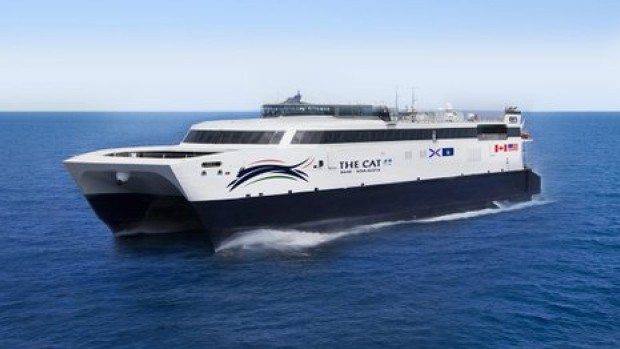This column originally appeared in the Halifax Examiner July 30, 2018.
I could say I told them so — and I did, way back when “them” was still Rodney Macdonald and his Tories, and from then on forward through Darrell Dexter and Stephen McNeil to whatever same-old-same-old will come next — but I’d have to stand in a too-long line behind all the other told-them-so nattering nabobs of negativism.
The fact the Yarmouth-Portland ferry is a bottomless subsidy suck that only seems to get deeper and suckier with each passing government has been a reality of political and economic life in Nova Scotia for more than a decade.
And yet…
Except for one brief blink-and-its-gone moment of semi-sanity, successive provincial governments have seemed willing, eager to dig us deeper and deeper into the ferry hole, then watch while the tide inevitably rolled in over all of us.
The exception came in the first heady days of Darrell Dexter’s NDP government when his shiny new-broom administration ran the numbers, realized an already bad situation — the ferry operator’s demands for subsidies were increasing while the number of ferry passengers decreased — would only get worse and pulled the plug.
At the time — keep this number in your head — the Tory government’s subsidy over the previous four years had totaled $15.7 million (just under $4 million a year if you’re doing the math in your head).
But the new “socialist” government’s free enterprise logic had barreled through a couple of flashing amber political lights: first, the NDP had no economic alternative development plan to help southwest Nova Scotia become more self-sustaining and, second and electorally much worse, it had no idea of the backlash its decision would set in motion.
By 2014 and in re-election trouble on all fronts, the NDP made a desperation decision to bring back the ferry and even cobbled together the outlines of a deal with a ferry operator to make it happen.
None of that helped the NDP get re-elected, but it did saddle its Liberal replacement with an almost fait accompli ferry deal.
Instead of rejecting it, McNeil first claimed credit for the final deal and then — when the new ferry service, like the last, failed to prosper — blamed the NDP and its choice of ferry operator.
So, in 2016, the McNeil government signed its own deal with its own new ferry operator, Bay Ferries, which itself was a former operator of the service.
The new subsidy was $32 million over two years: $16 million a year, or four times what it had been when the NDP shut the engines in 2009. Worse, that would only be the beginning of a 10-year subsidy deal for about $10-million more a year to keep the ship sailing into the mid-2020s. Worst, however, the province agreed to pick up any shortfall if the company didn’t achieve its goal of 60,000 passengers a year.
“Our goal, which I believe we have achieved,” Transportation Minister Geoff MacLellan said at the time, “was to put a stable, long-term agreement in place.”
How’s that working out?
Better for some than for Nova Scotia taxpayers.
In June, for example, Bay Ferries announced it was thinking of moving its American terminus from Portland, Maine, north to Bar Harbor. Nova Scotia taxpayers had already spent $4 million to upgrade the Portland terminal in 2016 and, most recently, forked over an additional $1.5 million this year to make the US Customs and Border Protection Agency happy.
If the service moves to Bar Harbor, it will cost another $3.5 million to make that city’s terminal ready to welcome ferry passengers. Guess who’ll pay for that?
While there are suggestions moving the US terminal closer to its Nova Scotia destination will ultimately save money, it’s worth noting that the initial $10 million a year subsidy already climbed to $10.9 million last year. (The government blamed increased fuel prices.)
Based on history, that subsidy is unlikely to magically become less over time.
Meanwhile, American tourists — the ostensible targets of this money-spinning exercise — do not seem to be lining up in numbers to come to Nova Scotia.
According to the latest numbers released by the City of Portland last week, in fact, the actual number of fare-paying passengers boarding the ferry in Portland in June — 6,701 — was down 13 per cent over the year before.
To be fair, last year’s overall passenger numbers — 38,933 — ended up 10 per cent higher than the year before.
But, to be even fairer, the province had based its original decision to subsidize the ferry service for $10 million a year on attracting 60,000 passengers a year.
Uh…
Will there ever come a point at which our government — any one of them — admits it’s time to stop flushing our money into the North Atlantic and begin investing in developing a sustainable local economy for southwestern Nova Scotia.
Don’t expect that to happen anytime soon. And don’t forget I told you so…
***

The two newspapers had been among the regional publications acquired by Montreal-based Transcontinental in the early 2000s and then sold again to SaltWire as part of Lever’s massive 28-paper deal in the spring of 2017.
While none of the journalists would claim to be a defender of Lever himself — “Wouldn’t trust Lever as far as I could throw him,” said one; “I cried when I heard he’d bought us,’ added another — they acknowledge that SaltWire has breathed some fresher editorial air into their newsrooms.
In part, of course, that’s because Transcon itself was such a lousy owner-publisher.
During the close to 20 years I wrote columns for the late Halifax Daily News under five different, increasingly awful owners, there was a black-humour joke in the newsroom that each new awful-er owner made you nostalgic for the last slightly less awful one.
Transcon was the last of the Daily News’s owners. It didn’t get worse after them.
“You should know [Transcon] was killing us fast,” one Newfoundland journalist told me. “I’d be surprised if we would have lasted five years more with them. Dropping jobs, running reporters to burn out. You should see our pay scales versus Chronicle Herald…”
The criticisms were similar at the Cape Breton Post where Transcon had taken “a cookie-cutter approach to its papers. They all looked exactly the same, including the [front-page] banner. The only difference was the actual name, but it was in this awful eye-bleeding orange.”
One of the first signs SaltWire might take a different approach came when the newsroom was told it could have its traditional banner back. It was a small matter, allows one of its journalists, “but it was one of those symbolic things… We’re really not under Transcon anymore.”
“SaltWire has also been a godsend in Newfoundland,” adds a Telegram reporter: “re-hiring laid off reporters, restoring editorial positions like a full-time business reporter position that had been cut. Local supports like IT are back and legal decisions are back and [SaltWire} is encouraging investigative work.”
“We’re far from naive about these things and there have been hiccups and I’m not nominating anyone at SaltWire for sainthood,” adds another Cape Breton journalist, “but whenever anyone comes up to me, cocks their head to the side and asks how things are at the Post, I always say I have no complaints about anything they have done with us so far. And I’m far from the only person that feels that way.”
I haven’t changed my mind about the general thrust of my original column. I don’t believe Mark Lever is capable of leading his bought-with-borrowed money newspaper empire into a successful future, and I think much of what he has done so far (borrow, buy, cut) simply replicates errors made by others that has led us to this dismal point in journalism.
That said, I also have to acknowledge there are other legitimate, well-articulated counter-arguments. Like those from the journalists at the two papers.
Let us hope… and pray.






 STEPHEN KIMBER, a Professor of Journalism at the University of King's College in Halifax and co-founder of its MFA in Creative Nonfiction Program, is an award-winning writer, editor and broadcaster. He is the author of two novels and eight non-fiction books. Buy his books
STEPHEN KIMBER, a Professor of Journalism at the University of King's College in Halifax and co-founder of its MFA in Creative Nonfiction Program, is an award-winning writer, editor and broadcaster. He is the author of two novels and eight non-fiction books. Buy his books